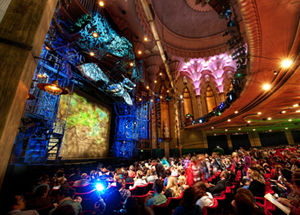The question: “Why study the arts and humanities” haunts our disciplines every day. This is not an easy question to answer because the language and the outcomes of fields such as classics, philosophy, ethics, literature, art history or theater are often broad, abstract, and by some accounts, even elitist. What are the humanities? What is humanistic and artistic study anyway? And why should you care or, even worse, make a career out of one or more of these fields? Instead of trying to convince you of the value of these fields in a traditional way, let me propose for one minute that William Shakespeare was right and “all the world’s our stage.”

This work is licensed under a Creative Commons Attribution-NonCommercial-ShareAlike 2.0 Generic License.
Imagine, then, that we become the actors and directors of the plays of our lives on this world stage. Similar to the production of a play, we would begin to envision the history and the social and cultural context within which this play took shape, with you as the protagonist. Where were you, our character, born? What language do you speak? What is your style in speech and dress? How does this style coincide with your life experiences, your background and ethnic heritage? What experiences might contribute to the way in which you view the world? What motivates you? What do you fear? What is your life story?
To stage this play, we would need to adopt, as Technical Director Steven Michalek explains, a host of different roles. We’d need to become technicians and “know science to understand the physics of lighting or the chemistry of cooking fake glass. We would need to know math to layout and construct an archway or something as simple as reading the fractions on a tape measure. We would need to know engineering to choose appropriate materials when building sets or flying performers. Designers would need to know about and be skilled in the myriad conventions of visual artists and sculptors in order to convey the appropriate moods and feelings in their sets, lights and costumes.”
If our lives may indeed be compared to a finely tuned theater production, then, as Michalek further explains, “the skilled theatre professional must also possess finely tuned creative problem solving and collaborative skills. Learning not just to succeed but excel within tightly defined parameters is the daily fodder of directors, actors and technicians.” To the extent that the theater serves as a metaphor for our lives, we do indeed need creative thought when times get tough, we need to engage positively and ethically with our neighbors and colleagues, even our enemies, we need to recognize that each and every one of our lives is determined by “tightly defined parameters,” such as family, class, and race. And each time an element in these and other parameters change, the entire world begins to change with it on what seems like an ever-moving stage of events. Were we to remove one of the above ingredients, say our ability to place life into context or talk about who we are, our ability to show what we do and what we stand for, then our play may be reduced to awkward pauses, silences, and absences. For us to remain on the world stage, retain an audience that witnesses our life’s play, we must find a healthy balance between thinking and acting as historians, engineers, lighting technicians, scientists, psychologists, writers, and literary analysts. Remove one of these components, and our sets might well fall apart. Lights out.
Why study the arts and humanities? Just imagine your play without them.
This post also appears on Henseler’s site The Arts & Humanities in the 21st Century Workplace

One thought on “Christine Henseler, “Why Study the Arts & Humanities?””